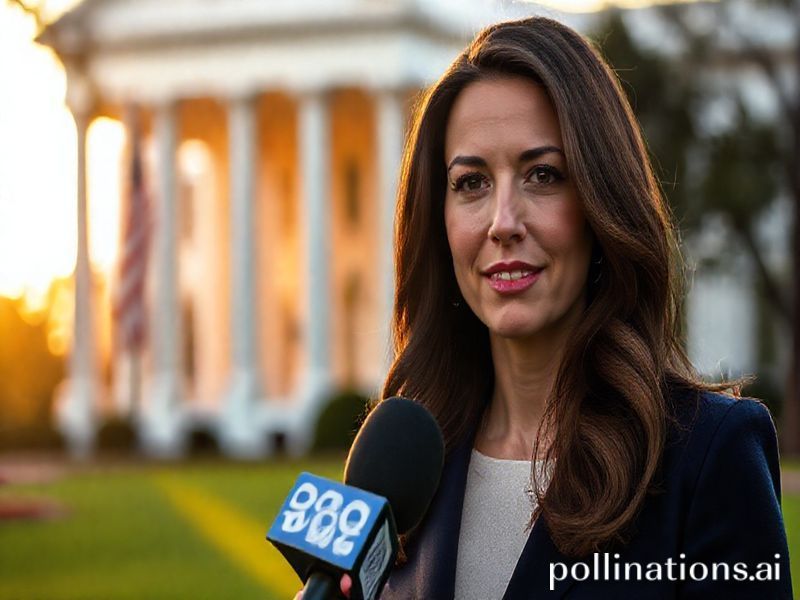kaitlan collins
Kaitlan Collins and the Global Gladiator Pit
A dispatch from the front row of the world’s most expensive reality show
By the time the sun rises in Kyiv, Kaitlan Collins has already made three governments flinch. By dusk in Jakarta, she’s on every diplomatic WhatsApp group, her questions clipped, translated, and weaponised. The 32-year-old CNN anchor has become the de-facto translator-in-chief for an international audience that no longer trusts its own leaders to tell the unvarnished truth—mostly because the varnish is usually still wet.
It began, as so many modern nightmares do, in the White House briefing room: a fluorescent purgatory where grown adults play musical chairs for the right to be lied to in real time. Collins, then a reporter for the Daily Caller—yes, that Daily Caller—started asking questions that were inconveniently specific. The answers were, predictably, fog. But the fog sold ads, and suddenly a kid from Prattville, Alabama, was the world’s unofficial stenographer of chaos.
Zoom out, and you’ll see why capitals from Canberra to Caracas care. When Collins pinned down Trump on disinfectant theology, the clip ricocheted through Latin American health ministries already fielding calls from citizens who’d mainlined bleach because the subtitles were late. When she grilled Biden on Afghanistan, European defence ministers rewound the tape like teenagers studying a TikTok dance, trying to divine whether the United States would still remember NATO exists next Tuesday.
There is, of course, something perversely colonial about the whole spectacle: a single American journalist’s 90-second exchange becomes foreign policy tea leaves for 195 countries that never got a follow-up question. But that’s the gruesome beauty of late-stage empire. The empire doesn’t even have to claim you; you still end up paying rent in its attention economy.
Collins’ elevation to CNN’s 9 p.m. throne this spring was greeted by the usual hosannas about glass ceilings and generational turnover—phrases that play well in fundraising emails but read like dark comedy in places where the ceiling was blown off years ago. Ask a Syrian journalist, assuming you can find one still alive, what they think of America’s latest “face of fearless journalism.” The silence will be educational.
Still, the international fixation makes perfect, cynical sense. Collins is fluent in the dialect of power without being fully co-opted by it—a neat trick, like juggling hand grenades after removing only half the pins. When she interviewed Narendra Modi in 2023 and asked, politely but firmly, about democratic backsliding, Indian news channels exploded into 48-hour panels debating whether the question itself constituted colonial interference. Meanwhile, opposition leaders saved the clip to their phones like a relic—proof that someone, somewhere, had said the quiet part aloud on camera.
The darker joke is that no one actually expects the answers to improve. We watch Collins the way Romans once watched gladiators: not because we believe the lion will suddenly apologise, but because the choreography of bloodletting is weirdly reassuring. If the questions are sharp enough, maybe the collapse will at least be narrated competently. That, in 2024, passes for hope.
And so the planet tunes in, from refugee camps buffering stolen Wi-Fi to boardrooms in Singapore where traders have muted the sound but left the captions on—just in case a stray sentence moves the crude oil market three cents. Collins herself remains professionally opaque, the human equivalent of a UN peacekeeper’s helmet: visible, symbolic, and careful never to take the wrong side of the shot line.
But symbolism has consequences. When Collins pressed Iran’s foreign minister on the morality police last fall, the clip became required viewing in Tehran’s underground classrooms. One student later told Amnesty International she’d repeated Collins’ question verbatim at her own interrogation. The guards laughed, then added five years to her sentence. The interview had, in effect, weaponised itself.
Which brings us to the final, grim punchline: journalism at this altitude is no longer about information. It’s about leverage. Every question is a futures contract on someone’s suffering, and the exchange never closes. Collins just happens to be the face on the trading floor, looking appropriately grave while the numbers scroll past.
So here’s to Kaitlan Collins, the accidental imperial envoy of the First Amendment, doing live shots in front of a White House that half the world would happily see repossessed. May her follow-ups stay pointed, her satellite feed unjammed, and her conscience mercifully numb. The rest of us can only watch, tweet, and pretend we’re not complicit in the ratings.







